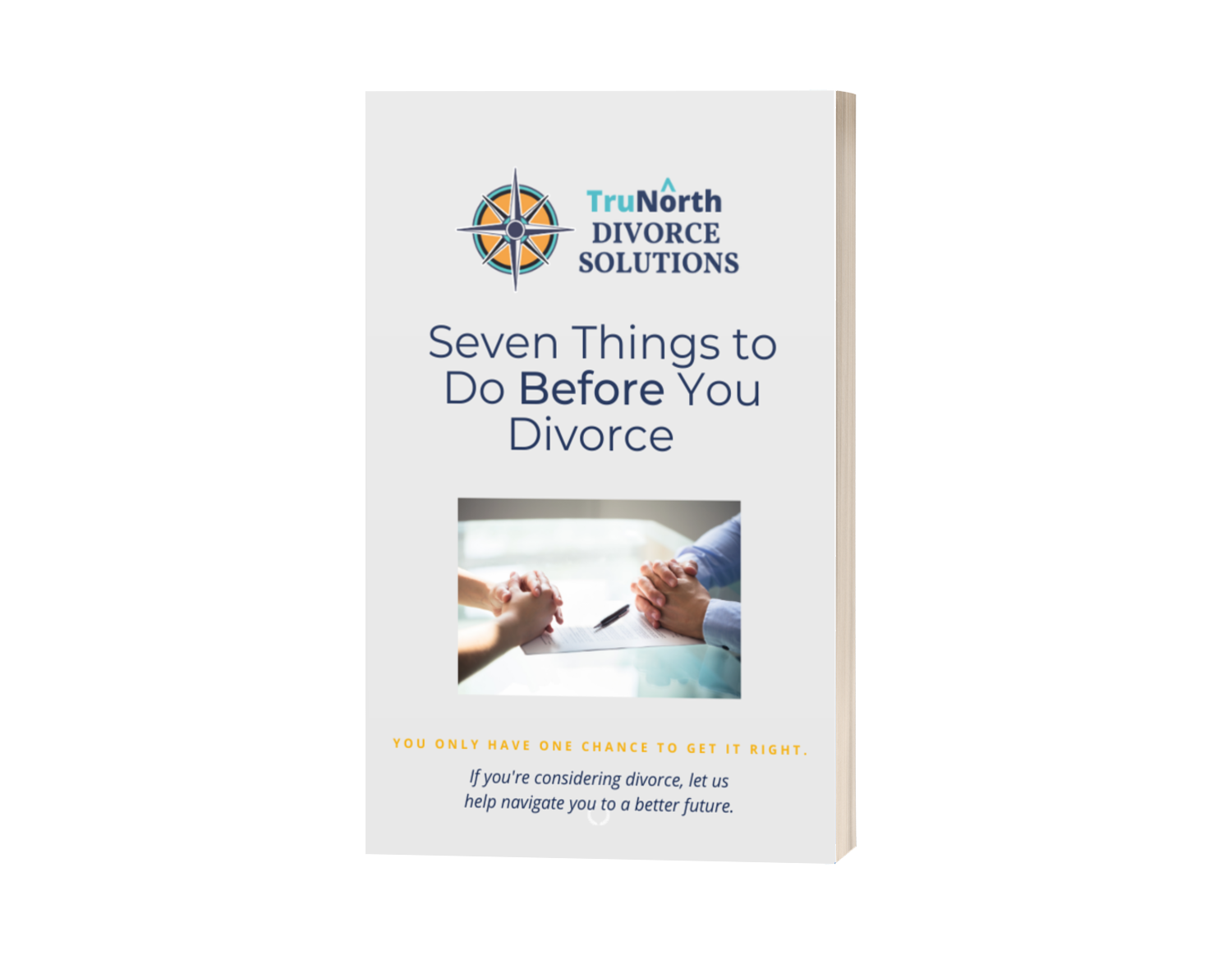SEVEN THINGS TO DO BEFORE YOU DIVORCE
Get Our FREE eBook!

While retirement might not be in the forefront of your mind during a divorce, it’s something that needs to be considered, especially if your facing a “gray divorce.” Divorce can have a profound impact on your retirement savings and financial future. Depending on the circumstances of your split, you may see your retirement prospects change dramatically.
So, how do you keep a divorce from wrecking your retirement? TruNorth Divorce has put together a list of three things to best protect your retirement.
Work with a Certified Divorce Financial Analyst (CDFA®) or a CDFA®-Mediator. CDFA®’s are experts at divorce finance and know how to preserve your retirement. They understand how taxes work with various kinds of assets and how to value a pension. They can predict the tax consequences of transfers between spouses, and help to ensure your retirement moneys will be properly transferred between spouses.
Lawyers do not have this expertise! At TruNorth Divorce our mediators and advocates are not just expert mediators, they are also CDFA’s and trained divorce coaches. The law is typically a non-issue in most divorces—most divorces don’t need to be processed through the legal system. Your settlement agreement, custody agreement, and divorce filings will always be legally compliant and the quality of your divorce far better when you work with TruNorth Divorce than if you work with an attorney alone.
Not all assets are treated the same by the IRS. Equity in a house isn’t taxed up to $250,000 per spouse (assuming there are no other prior real estate rollovers pre-1997). Withdrawals from an IRA are taxed at your marginal tax rate. Big difference. Likewise, joint funds in brokerage accounts can be subject to capital gains taxes.
Also, the division of retirement account assets during a divorce, specifically, can have unique tax implications and governing regulations. It’s important to look at the particulars of each account and determine its actual after-tax value. A Roth IRA with $50,000 sitting in it is worth more than a 401(k) with the same amount of money. A pension distribution of $50,000, too, will be treated differently tax-wise.
The Employee Retirement Income Security Act of 1974 protects retirement assets in 401(k), 403(b), and Thrift Savings Plans for federal employees and military personnel. For these plans, you will need to draft a qualified domestic relations order (QDRO) so that the asset split becomes legal and for retirement plan administrators to accept and execute it.
A QDRO endorsed by a judge and executed properly provides a means to roll over a portion of a qualified retirement plan without penalty, tax-free. Depending on the circumstances, you may choose to continue contributing to the retirement plan. You could also roll it over into a Roth IRA through a trustee transfer. You can even take penalty-free withdrawals from transferred qualified retirement plans when they are handled within a QDRO—very helpful if you need some extra cash for a house down payment or to retire debt. Without a well-drafted QDRO you could wait years for your retirement account transfer.
Taking the proper steps to accurately assess your retirement assets during a divorce will put the right financial foot forward as you wipe the slate clean and retake sole ownership of your assets. For more post-divorce budgeting tips and all topics divorce, visit our blogsite.
Reach out to a divorce mediator in Maryland if you want a kinder, smarter, and more affordable divorce. If you’re on the fence and you have a list of concerns related to your divorce, don’t hesitate to Schedule a Free Strategy Session to go over your options.
Get A free Consultation
484.321.6990
hello@trunorthdivorce.com
Divorce at any age is a difficult experience. If you’re over 50 you’ve got obstacles that the younger don’t encounter. You’ve got fewer years to bounce back and less energy. But before you throw in the towel, look on the brighter side: you’re now the captain of your own ship. You have the opportunity to navigate to a destination of your own choosing. At the age of 50 we can expect to live another 35 years and there’s much to look forward to if you properly plan and adjust course.
The term “gray divorce” refers to couples who are separating after a long-term marriage or are older in age (gray-haired). Here’s what you need to consider if you’re going to thrive after a later-life divorce.
As with all divorces, you’re going to have to split your assets and create two households. Two living separately is not as cheap as two sharing a household and your share of the assets isn’t going to see you through retirement like the whole pie was going to for the two of you. If you’re middle-age plus you don’t have as many years to recover like you did if you were in the prime of your career. You’re going to have to significantly ramp up those savings or downgrade your retirement expectations. Yes, that stinks, but moaning and groaning isn’t going to make it any better.
So what can you do about it? Cut back, save more, get creative, create a household with a friend, find a new partner/spouse, ramp up your career, and, if you are currently preparing for divorce, consider a less costly process that can adequately address the complexities of your situation, i.e., mediation or a collaboration.
No, two can’t live as cheaply as one. If you’re lucky, that means you may not have access to a vacation home anymore; if you’re living more frugally, you may have to compromise your lifestyle more drastically—in housing, cars, clothing, entertainment, etc. Regardless, you worked hard to get to where you are in mid or later life and it’ll feel particularly daunting that you’re no longer going to be living like you did before the split.
So, what to do? Buck up, for one. Whether this gray divorce was your choice or not, it’s not going to help if you wallow about your present financial state. Your friends don’t want to hear it repeatedly and your kids don’t want to listen to it anymore, either. Make the best of what you’ve got and make a plan. What can you afford? Utilize a financial planner to create a budget and goals. Determine what’s really important to you and work for it. Set realistic expectations and then adapt.

Women, especially, may have cut back on working to be home with the kids or care for the home. Now they are faced with a temporary alimony order and need to get back to work if they are going to be able to pay the bills and save for retirement. But who is going to hire you now that you’ve been out of work for so long? Or maybe it’s time for a career change or to put it on a faster track and you’re not sure how to go about it. Enlist the help of a career coach if you don’t have any ready-made answers. And before you say you can’t afford to enlist a career coach, let me say that yes, you’re going to have to spend some money to make some money.
Your spouse may not have been good company in the later years of your marriage but at least s/he was a warm body who grunted once in a while, right? There will be times when you’re jubilant that you’re free to do as you please and excited about enhancing the friendships you have and making new ones. There’ll come a time, too, that you’ll feel a bit empty and lonely. Remember that you have to let go of things, people, and circumstances that hold you down in order to make room for ones that will lift you up! Work with a divorce coach or a therapist, join some clubs, and accept the times of loneliness as necessary in order to move on. You will again have a full life!
As for dating, that’s a choice you need to make based on your own needs and desires. Online dating works for some and there are numerous avenues to pursue if you want to meet potential partners. Don’t get out there, though, until you’re happy with your life and circumstances. If you’re lonely, depressed, or bitter, get some help to deal with those issues before you go partner hunting.
Let’s face it, at 50+ we’re going to have more health issues. When you had a partner who looked after you, willingly or reluctantly, you had a crutch. Now you don’t. So it’s even more important to take care of yourself. Eat better, get some exercise, and develop a support network. If you can afford it, purchase long-term care insurance. If you can’t, talk to your children, other relatives, and close friends about a plan if you are temporarily or permanently disabled.
Getting older has its plusses and minuses no matter your marital status. If you’re becoming single as an older person, you need to face your realities and make plans to address them head on. If you don’t you may find yourself alone, broke, disabled, and unhappily dependent on others. It’s up to you to make informed and wise choices so that you thrive after your divorce.
Reach out to our trained divorce mediators and personal divorce coaches to help you through this confusing and and often frustrating time. Gray divorce isn’t easy and we can help to guide you through it.
Get A free Consultation
484.321.6990
hello@trunorthdivorce.com